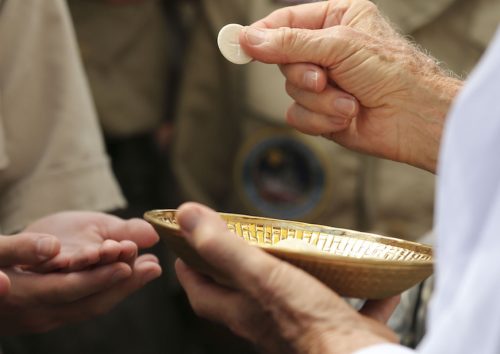Q. As an extraordinary minister of holy Communion, I have something bothering me. As we give out Communion, we say “body of Christ” for the host and “blood of Christ” for the chalice. But aren’t we actually offering the “complete Christ” — body, blood, soul and divinity — under each species? (Ogallala, Nebraska)

A. You are correct. In fact, the U.S. Catholic bishops answered that exact question in a 2001 document titled “The Real Presence of Jesus Christ in the Sacrament of the Eucharist,” which states: “Christ Jesus, our Lord and Savior, is wholly present under the appearance either of bread or of wine.” This is a comfort to those who are unable to receive under both species. Some, for example, may have a wheat allergy, and a low-gluten host may not be available; others may have an alcohol addiction where even a single sip could trigger a problem.

When possible, though, it is appropriate to receive under both species — since that serves as a more precise reminder of the Last Supper when Jesus, instituting the Eucharist, passed around both the unleavened bread and the chalice saying, “Take and eat” and “Take and drink.”
Q. I think that faithful Catholics would like to know about the validity of the sacraments received from disgraced or defrocked priests and bishops. Were sins forgiven in the sacrament of penance? Did the act of consecration take place for the bread and wine to become the body and blood of Christ? (Saratoga Springs, New York)
A. I friend of mine who was married years ago by a Catholic cleric later removed from ministry likes to tell me — jokingly — that his wedding “did not count” and that he is free now to marry someone else! That, of course, is not true.
The question you raise was answered in the church nearly 1,700 years ago in what was known as the Donatist controversy and ratified later in the teaching of St. Augustine. Since it is really Christ who is acting in the sacraments, the personal unworthiness of the minister would not prevent Jesus from acting.
Later, medieval church theologians would explain it in more formal terms by saying that the sacraments operate “ex opere operato” (“from the work having been done”) and not “ex opere operantis” (“from the work of the worker”).
As the Catechism of the Catholic Church states it today, “From the moment that a sacrament is celebrated in accordance with the intention of the church, the power of Christ and his Spirit acts in and through it, independently of the personal holiness of the minister” (No. 1128).
Questions may be sent to Father Kenneth Doyle at askfatherdoyle@gmail.com and 30 Columbia Circle Dr., Albany, New York 12203.






















